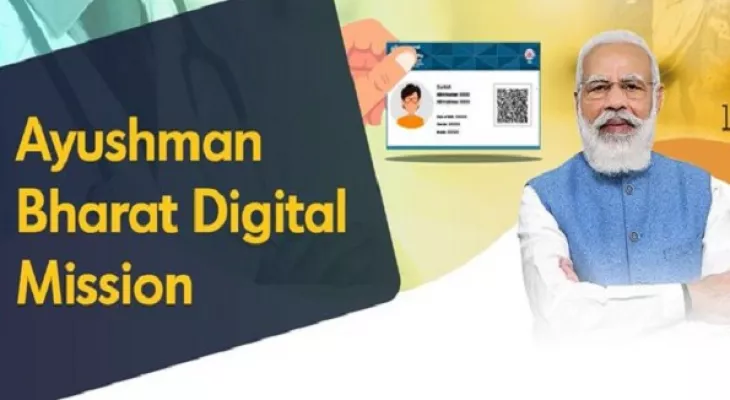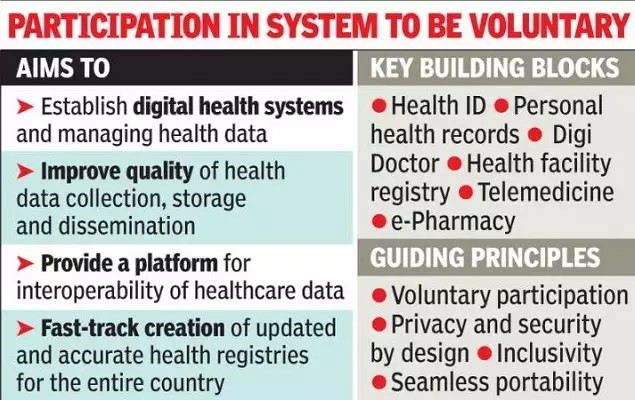Description

Copyright infringement not intended
Context: According to the Union Ministry of Health and Family Welfare, the use of QR codes to facilitate registration at hospital counters has benefited approximately 5 lakh patients since October 2022.
Details
More about the QR code-based registration system at the Hospital
- In October 2022, the National Health Authority (NHA) under the Ayushman Bharat Digital Mission (ABDM) introduced the ‘Scan and Share’ service for faster outpatient department (OPD) registrations.
- Since then, 365 public and private hospitals have started using the system.
- The partnering hospitals, both public and private, display their particular QR codes in areas where patients register.
- The patients can scan the QR code using any health application such as the ABHA app, Aarogya Setu app, Bajaj Health or PayTM and share information like name, age, gender, and unique health ID [ABHA number] to the Health Management Information system [HMIS] of the hospital.
- Significance:
- The system facilitates paperless registration and thereby instant token generation.
- The health facility can maximize the use of resources allocated for registration while the patient saves time.
- Ayushman Bharat Health Accounts are digitally linked to the patient's medical data as a result of this process.
- Patients can manage and access their data from their phones at any time and from anywhere.
- Both the patient and the medical facility can maximize the use of their resources.
- This ‘Scan and Share’ service is a standard example of how technology can be leveraged to provide better services to patients and to improve the system's efficiency.
- The service is currently provided in 125 districts across 25 States and UTs.
.jpeg)
Ayushman Bharat National Digital Mission
- The Ayushman Bharat Digital Mission (ABDM) aims to develop the backbone necessary to support the integrated digital health infrastructure of the country. It will bridge the existing gap among different stakeholders of the Healthcare ecosystem through digital highways.
- It aims to create a national digital health ecosystem that supports universal health coverage in an efficient, accessible, inclusive, affordable, timely and safe manner, that provides a wide range of data, information and infrastructure services, duly leveraging open, interoperable, standards-based digital systems, and ensures the security, confidentiality and privacy of health-related personal information.
- It ensures access to quality healthcare by promoting the use of technologies such as telemedicine and supporting the national portability of health services.
- Citizens can create their ABHA (Ayushman Bharat Health Account) numbers, to link their digital health records.
- The National Health Authority is the implementing agency of the Ayushman Bharat Digital Mission (ABDM).

|
National Health Authority (NHA)
- National Health Authority is the successor of the National Health Agency, which was functioning as a registered society since May 2018. National Health Agency was reconstituted as the National Health Authority in January 2019.
- The NHA is governed by a Governing Board chaired by the Union Minister for Health and Family Welfare and is headed by a full-time Chief Executive Officer (CEO).
- NHA has been entrusted with the role of designing a strategy, building technological infrastructure and implementing a “National Digital Health Mission” to create a National Digital Health Eco-system.
|
Concerns
- Privacy concerns and misuse of data.
- Exclusion of citizens and denied healthcare due to System failure or technical errors.

Way Forward
- The current strong public digital infrastructure—including that related to Aadhaar, Unified Payments Interface and wide reach of the Internet and mobile phones (JAM trinity) —provides a strong platform for establishing the building blocks of the Ayushman Bharat Digital Mission (ABDM).
- The existing ability to digitally identify people, doctors, and health facilities, facilitate electronic signatures, ensure non-repudiable contracts, make paperless payments, securely store digital records, and contact people provide opportunities to streamline healthcare information through digital management.
- Emerging technologies such as artificial intelligence, the internet of things (IoT), Blockchain and cloud computing provide additional opportunities for facilitating a more holistic digital health ecosystem, that can increase equitable access to health services, improve health outcomes and reduce costs.
|
PRACTICE QUESTION
Q Critically analyzes the role of the Ayushman Bharat Digital Mission in reforming the Healthcare sector in India.
|

https://www.thehindu.com/sci-tech/health/five-lakh-patients-availed-tech-enabled-queue-less-opd-services-says-health-ministry/article66545325.ece
















